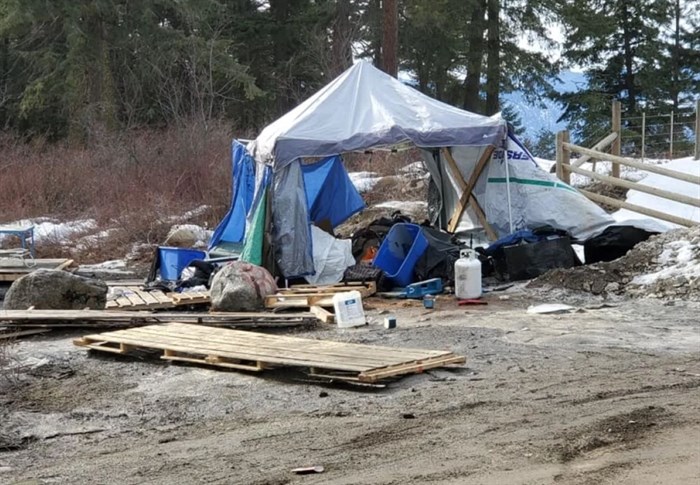
While up to 75 people have been counted sleeping rough on any given night in and around downtown Kelowna, not all those living rough stay in that area.
Image Credit: Okanagan Forest Task Force
December 08, 2021 - 1:09 PM
The goal of Kelowna having functionally zero homelessness by 2024 is getting shaky as the number of those needing shelter is increasing dramatically.
“Year upon year we have more people experiencing homelessness,” Stephanie Gauthier (formerly Ball), executive director of the Journey Home Society, told iNFOnews.ca. “In our community, if you’re on a fixed income, even with rental supplements, housing affordability just isn’t there.”
Plans to open a new winter shelter space fell apart at the 11th hour this fall when the property owner pulled out. There are now up to 75 people sleeping rough in Kelowna on any given night, and that’s just in the downtown and North End areas of Kelowna.
READ MORE: Kelowna can’t keep up with growing demand for shelter spaces for the homeless
"Housing affordability really continues to be the biggest issue, " Gauthier said. "On top of people that are sleeping outside, we’ve got a lot of people in our community sleeping in their cars, individuals and couples and even families that are being identified."
There’s an increasing number of “renovictions” where people are evicted so the owner can renovate and re-rent for much higher amounts.
“We’ve had dozens and dozens of people evicted this year,” Gauthier said. “There was one building where people had lived for years and years and years, including seniors on a very fixed rent basis. That building was sold off to a land developer this year so we had dozens that became homeless as a result of that.”
Adding to the problem is the growing number of units used for short term rentals through firms like Airbnb, cutting into the supply of long term rental, she said.
A study earlier this year found that 50% of those renting in Kelowna were spending more than they could afford on rent, forcing them to choose between paying rent and buying food, Gauthier said.
This comes despite the fact that more than 300 supportive housing units were built by B.C. Housing in the last couple of years.
Journey Home is a non-profit organization funded, in part, by the City of Kelowna. It's trying to virtually eliminate homelessness but its target for doing that by 2024 is being reviewed.
Gauthier is developing a data modelling system that she expects will give a clearer picture of existing and future housing needs by next spring.
“Even at the time the Journey Home strategy was developed a number of years ago, housing affordability, the drive for people to move to the Okanagan and a number of factors have really shape-shifted what we thought the predictions were going to look like,” she said.
The goal is not to continually add more emergency shelter spaces, though there is a need for that.
Having the expected shelter fall through was a huge blow.
“It’s been a bit of a heartbreaking and, at times, frustrating climb to try and ensure we have enough spaces for people this winter,” Gauthier said.
Agencies are prepared to manage more shelters and the city is looking for those spaces.
While most shelters are in the downtown core, the one that fell through was not. But it was near transit and other services that are essential for such shelters.
While still looking for more spaces for this winter, consideration is already being given to meet the growing need next winter and there will be an effort to find smaller facilities.
But, it’s more than shelter spaces.
“This isn’t really what we want to be doing in terms of continually expanding shelters,” Gauthier said. “We really need to drill down and focus on housing solutions.”
Part of that is collecting the data to convince senior levels of governments fund more housing.
Another part of that is developing a diversion program for people falling into homelessness.
“Sometimes, when people find themselves homeless, it’s a crisis situation and you don’t always have the time to breathe and consider what other recourse you have, whether that’s staying with a family member for a few months or things like that,” Gauthier said.
She’s also looking at a rent subsidy program through supportive businesses to help people stay in their homes rather than go through the trauma of moving into a shelter or, worse yet, onto the street.
While there has been increased federal support in the past 18 months, the growing numbers of people sleeping on Kelowna streets shows there’s much more that needs to be done.
READ MORE: More money won't solve homeless crisis in Okanagan, Kamloops but leadership will: expert
To contact a reporter for this story, email Rob Munro or call 250-808-0143 or email the editor. You can also submit photos, videos or news tips to the newsroom and be entered to win a monthly prize draw.
We welcome your comments and opinions on our stories but play nice. We won't censor or delete comments unless they contain off-topic statements or links, unnecessary vulgarity, false facts, spam or obviously fake profiles. If you have any concerns about what you see in comments, email the editor in the link above.
News from © iNFOnews, 2021